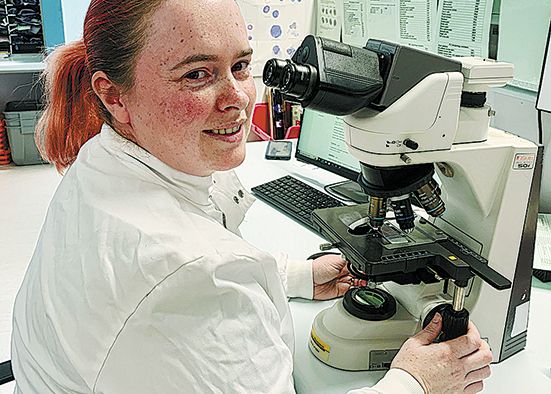Gemma’s work in Ulster laboratory
Gemma’s work in Ulster laboratory
4 December 2024

A SAINTFIELD woman is one of the many unsung heroes working feverishly behind the scenes at the Ulster Hospital.
Gemma Magennis is part of the Dundonald hospital’s team of healthcare scientists and support staff and their work is more vital than ever in the world of modern medicine.
National Pathology Week reflects how those who are working 24/7 in hospital laboratories alongside doctors, nurses and healthcare professionals to aid in the diagnosis, treatment and management of disease.
Within the Ulster Hospital Laboratory, over one million samples are processed every year, producing approximately 5.5 million test results.
An avid advocate of all things science, Haematology Biomedical Scientist Gemma has been working in the Ulster Hospital laboratories for the past eight years and has explained how part of her role is to “look for abnormalities in patient’s blood samples”.
She continued: “Biomedical science is quite a diverse subject and it can take you into different pathology areas including haematology which I just love.
“Just three cells can tell you so much about a person including
their red and white blood cells, and platelets which can reveal if someone has an iron or B12 deficiency or leukaemia.”
Without hospital laboratories, doctors and healthcare professionals would be unable to provide accurate diagnoses and develop effective treatment plans.
They play an increasingly critical role in ensuring patient safety and improving healthcare outcomes and are also responsible for conducting a wide range of tests, including blood tests, microbiology and pathology.
The laboratory at the Ulster is “split into three sections” with Gemma explaining there is the haematology side with scientists also carrying out coagulation tests which is your blood’s ability to clot.
“We look at all the different factors in your blood to see if anything is abnormal in terms of increasing your chances to clot or increase your risk of bleeding,” she said. “We work in the Blood Bank as well so we look after people who need transfusions.”
Gemma has also described how important pathology is as a service.
“Working within pathology is very important. Seventy per cent of medical decisions are based on a blood test.”
And for anyone thinking of pursuing a career in pathology, Gemma’s advice is simple “jump on it”.
She added: “It’s one of the most diverse careers you can have and you can go anywhere with it.
“If you love science, like I do, you still get to look down a microscope with a career in pathology and I love it. I would recommend it to anyone.”


